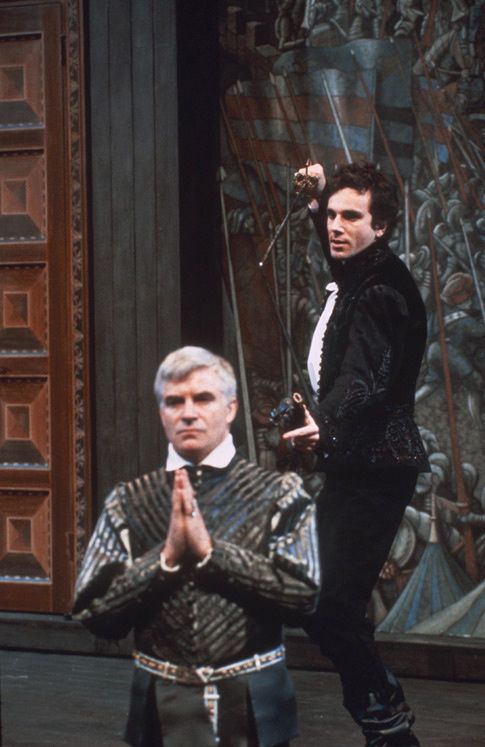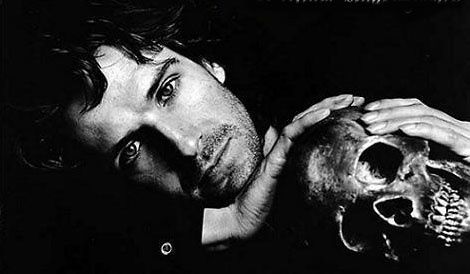 Depuis le jour où j'ai été en mesure de lire Shakespeare, Hamlet a instantanément figuré parmi mes pièces favorites. D'abord, parce
qu'elle trouve son origine dans l'histoire des pays nordiques, qui me fascine depuis longtemps. En effet, on pense que Shakespeare a tiré l'essentiel de sa pièce d'un ouvrage écrit au XIIème
siècle par Saxo Grammaticus (que je vous recommande d'ailleurs) qui se veut une histoire du Danemark et qui s'intitule La geste des Danois. L'un des chapitres est consacré au Prince de Jutland,
Amlethus, qui simula la folie pour venger la mort de son père.
Depuis le jour où j'ai été en mesure de lire Shakespeare, Hamlet a instantanément figuré parmi mes pièces favorites. D'abord, parce
qu'elle trouve son origine dans l'histoire des pays nordiques, qui me fascine depuis longtemps. En effet, on pense que Shakespeare a tiré l'essentiel de sa pièce d'un ouvrage écrit au XIIème
siècle par Saxo Grammaticus (que je vous recommande d'ailleurs) qui se veut une histoire du Danemark et qui s'intitule La geste des Danois. L'un des chapitres est consacré au Prince de Jutland,
Amlethus, qui simula la folie pour venger la mort de son père.
Je n'avais bien évidemment jamais voulu voir Hamlet sur scène car je trouve les traductions françaises insupportables. J'ai fait cependant une
petite exception il y a quelques années, en assistant à une représentation d'une petite compagnie, par une belle fin d'après-midi ensoleillée, au Théâtre de verdure du jardin Shakespeare niché au
coeur du Bois de Boulogne, près de Paris. Je n'ai pas regretté.
Il y a quelques années, j'ai découvert, un peu par hasard, la traduction de Marcel Pagnol, dont les explications m'ont vraiment enchantée. Dans une
excellente préface, celui-ci révèle les erreurs de traduction qui firent de la pièce un momument d'absurdités au début du XXème siècle (et à la fin du XIXè aussi d'ailleurs). Les grands sujets de
discussion portèrent sur son aspect physique et sa folie.
A titre d'exemple, voici quelques erreurs dûment relevées par M. Pagnol :
Lors du dialogue entre Hamlet et Ophélie, au troisième acte, les propos tenus par le prince sont relativement crus et obscènes. Les traducteurs
s'empressèrent donc de gommer cet effrayant aspect mais il en résulta des phrases compliquées et ridicules, et pour tout dire...incompréhensibles.
Enfin, une erreur de traduction fut également à l'origine de discussions sans fin sur l'une des tirades les plus célèbres, et probablement d'une
erreur de compréhension. Jugez plutôt : Au début de la pièce, après qu'Hamlet ait vu le fantôme de son père, il entame un monologue qui va expliquer toute sa conduite future. Le vers anglais
était celui-ci : "While memory holds a seat, In this distracted globe !". La plupart des traducteurs crurent qu'il s'agissait du globe terrestre, et par conséquent, le vers français n'avait aucun
sens. Marcel Pagnol proposa alors une autre solution. Et si par "globe" Hamlet voulait dire sa tête, son crâne ? Après avoir vu le fantôme, il sentait qu'il devenait fou... distracted globe. On
peut donc se demander si le pauvre Hamlet a simulé la folie jusqu'au bout, ou bien s'il était plutôt la proie de crises nerveuses, et de folies passagères contre lesquelles il ne pouvait
rien...

Hamlet a évidemment été interprété un nombre incalculable de fois, aussi bien au cinéma qu'au théâtre, par
des comédiens inconnus, des acteurs illustres. Vous ne sauriez à quel point je rage de ne pouvoir assister à l'une des représentations londonniennes de juin ou juillet, Jude Law
incarnant le sombre prince. D'ores et déjà la presse spécialisée doute que la prestation de Jude Law soit convaincante. Difficile d'incarner le prince de Jutland sur scène où aucune tricherie
n'est possible. Exercice périlleux qui peut facilement perdre un acteur pour peu que la critique décide de l'éreinter...
Certains de mes acteurs favoris ont eu l'honneur, et l'audace, d'endosser le costume d'Hamlet : Daniel Day Lewis, Alan Rickman, Kenneth Brannagh et Ralph Fiennes, entre autres.
En 1989, Daniel Day Lewis obtint des critiques mitigées. Public et presse ont surtout retenu son interprétation pour un fait désormais célèbre : au cours d'une représentation, au moment où Hamlet
voit le fantôme de son père, l'acteur quitta précipitamment la scène. Il ne reprit jamais son rôle. Il a raconté à de nombreuses reprises, qu'il vit ce soir là le fantôme de son propre père...
Lewis est l'homme de toutes les passions et de tous les excès ; on sait à quel point il est capable de s'immerger pour un rôle, cette anecdote n'a donc rien de surprenant !
Un extrait du New-York Times :
The critics were less generous with Mr. Day-Lewis, who is best known for his work in films like ''A Room With a View,'' ''My Beautiful Laundrette'' and ''The Unbearable Lightness of Being.'' Mr. Billington called the actor ''everyone's picture-book idea of Hamlet'' but found him lacking the role's ''demonism'' and ''sense of danger and menace.'' John Gross in The Sunday Telegraph found Mr. Day-Lewis's Hamlet weak, missing ''the deep reserves of bitterness and bitter intelligence that make Hamlet a hero as well as a victim.''
Several writers criticized Mr. Day-Lewis's command of Shakespearean verse and the speed
with which he delivered his lines. ''We lose the poetry,'' wrote John Peter in The Sunday Times. Yet Mr. Peter also said the performance was a ''confident and impressive debut from a brilliant
actor whose Shakespearean experience is limited.'' And Michael Ratcliffe of The Observer found it ''a performance of much promise, still in awe of the play and the
role.''
Même chose pour Alan Rickman, en 1992. Les critiques firent la fine bouche.
Extrait de The Independent :
Alan Rickman's Hamlet does the ' 'Tis now the very witching time of night' speech in cod cloak-and- dagger fashion, with a Richard III-style limp and a raised sword that ends up, like a flamenco dancer's rose, clamped between bared teeth. A witty way of signalling the mismatch between man and role, the speculative intellectual crudely cast as revenge hero? Well yes, but the self-conscious spoofing here is also one of several indications that Rickman is much more at home with the playful, sardonic side of Hamlet than he is with the confused, raw passions.
There is little sense of inner conflict in this performance, because it never properly
convinces you that one part of Hamlet envies simpler natures and genuinely thirsts for his uncle's blood. At times, the staging only compounds this weakness. Rickman's Hamlet dangles from a
balcony, for instance, over the praying Claudius.

En revanche, les critiques furent beaucoup plus enthousiastes pour ces deux acteurs :
Kenneth Brannagh, bien avant d'en réaliser l'adaptation cinématographique, a lui aussi incarné Hamlet au théâtre. C'était en 1988, sous la direction de l'excellent acteur Derek Jacobi. Alléchant
non ? Brannagh fut assez vite comparé à Laurence Olivier et fut remarqué
pour sa fougue et sa passion au service du grand Will.
Un extrait de The independant :
Kenneth Branagh's compelling Hamlet impresses us as a man whose nature is ferociously divided
against itself, and whose co-operation with the creaky convention of revenge-tragedy is painfully ambivalent.'

Ralph Fiennes s'y colla en 1995. Il rafla un Tony Award pour sa prestation. On loua surtout sa diction, sa voix et son jeu dans cette mise en scène contemporaine.
Un extrait d'une critique du New-York Times:
"Produced under the auspices of London's prestigious Almeida Theater Company, the Kent-Fiennes "Hamlet" is not one for literary sleuths and Shakespeare scholars. It respects the play, but it doesn't provide any new material for arcane debates on what it all means.
Instead it's an intelligent, beautifully read and set production that serves the new star as much as he
serves it. Mr. Fiennes, who slipped into our collective consciousness through "Schindler's List" and "Quiz Show," is in command at the Belasco from beginning to end. He's a charismatic stage
actor. He has a fine strong voice (and complete control of it) that never becomes monotonously distinctive."

Les extraits des critiques sur la performance de Jude Law :
The Independant : "Law sports tousled, out-of-bed hair and a deltoid-hugging T-shirt. Yet in another way, this muscularity makes a refreshing change. Here is no wavering wraith, but rather a distinctly physical, frustrated young man – a trained fighter as well as an intellectual – who could easily turn violent."
BBC : "judging by the cheers at the end of his Hamlet debut last night, Law has a hit on his hands, despite a few off-key notes." She added that Law lacks the wit and humor displayed by David Tennant's Hamlet earlier this season, but that he "delivered the play's big lines with ease."
The Guardian : "I missed the quicksilver humour that is part of Hamlet's character. But Law's Hamlet has the right inwardness and self-awareness. People who come to patronise him as a movie star essaying the great Dane will be in for a shock. He is a far from inexperienced classical actor and conveys the idea of Hamlet as a man who, as the critic John Wain once said, 'cannot gear his meditation to action' and who is half in love with easeful death."
Pour finir, un poème de Carl Sandburg, tout à fait approprié...
THEY all want to play Hamlet.
They have not exactly seen their fathers killed
Nor their mothers in a frame-up to kill,
Nor an Ophelia dying with a dust gagging the heart,
Not exactly the spinning circles of singing golden spiders,
Not exactly this have they got at nor the meaning of flowers—O flowers, flowers slung by a dancing girl—in the
saddest play the inkfish, Shakespeare, ever wrote;
Yet they all want to play Hamlet because it is sad like all actors are sad and to stand by an open grave with a joker’s
skull in the hand and then to say over slow and say over slow wise, keen, beautiful words masking a heart that’s
breaking, breaking,
This is something that calls and calls to their blood.
They are acting when they talk about it and they know it is acting to be particular about it and yet: They all want to play
Hamlet.



/image%2F0550903%2F201311%2Fob_def7631e6b182e13b0b6893b7bbe2f16_calderon.gif)
/https%3A%2F%2Fassets.over-blog.com%2Ft%2Fcedistic%2Fcamera.png)
/http%3A%2F%2Fi.dailymail.co.uk%2Fi%2Fpix%2F2012%2F06%2F14%2Farticle-2159520-1397AB57000005DC-297_306x524.jpg)
/idata%2F1934669%2F%2Fjudelaw-hamlet.jpg)